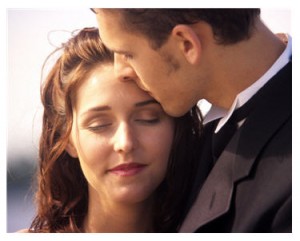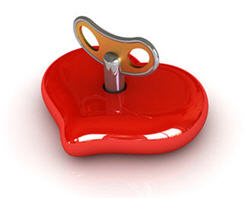 Three little words – you know the ones. We all want to hear them. We all want to say them.
Three little words – you know the ones. We all want to hear them. We all want to say them.
Those three little words are spun, sung, whispered and wished for. They are immortalized on film, they monopolize our music, and they pump blood through our most lauded literature. So why is saying “I love you” so problematic? And finding love, even more so?
I love you, I love you not
What if you hear those words, and you don’t feel the same way?
What if you say them, and the sentiment is not returned?
As little girls, we pluck petals from the flower, and repeat I love you, I love you not. In France, I learned a different refrain: Je t’aime – un peu, beaucoup, passionément, à la folie. Loosely translated: I love you a little, very much, passionately, madly.
Wouldn’t it be easier if we had ways to communicate degrees of affection? More options than love’s presence or absence?
Timing is everything
Sometimes, feelings don’t blossom at the same pace. Sometimes life’s challenges intervene. Sometimes, you stumble into someone terrific, but the alchemy is missing, or perhaps it isn’t there yet.
- If someone says I love you, and you don’t feel it, do you walk away?
- Is it reasonable to expect your lover to wait until you catch up?
- Is it different when you’re 30 or 50, or 80?
- Are you more cavalier if you think you have all the time in the world?
- More appreciative, when you have a second chance at love?
There are times we are in transition, or vulnerable, and apt to say those three little words. They affirm that we are living positive emotions again.
There are times we are frightened, and we need to speak those three little words. Sometimes hoping for the solace of their return.
“I love you” takes courage
There are times we seek to risk, to grow, to share deeply; we create love or we indulge in love, desiring the intensity of the emotions that comprise it – grand, grandiose, momentous, surprising, delicate, vulnerable, silly, empowering. We feel it, we revel in it, we want to live it fully.
Romantic love, and three little words. What bravery it takes to speak them, and mean it. What bravery it takes to speak them only when you mean it.
Three little words.
- When did you hear them last?
- When did you speak them last?
- Do you know the key to your own heart?
- Do you love safely, deeply, passionately, or even madly?
As I age, it’s much easier to say I Love You. Maybe because the people I say it to already belong to me, so I’m sure of them.
They are always wonderful words to hear.
While I can agree with TKW on how wonderful the words are to hear, I do not know that saying “I Love You” gets any easier with age. I still find it difficult to let my guard down enough to say these words, except to my children and they do not always want to hear it.
BLW – Thank you for this post. This question, these sentiments have been rolling around in my mind for days. Now I have read them from someone else, I know I am not as insane as I thought I was becoming.
I am a believer in saying these words to those I love. I think that hearing them a lot makes them deeply known (as opposed to meaningless and trite). I believe this firmly even though I know others feel differently.
I use these words all the time and the more I use them the better I feel. And there is NO BETTER FEELING than hearing them from my little 3 year old twins. Its truly the best thing I can think of – better than coffee! better than chocolate!
But romantic love… ? I feel foggy about that one now as I near my 41st. I believe in it, but I don’t know about the whole ‘everlasting’ idea anymore.
I love TheKitchenWitch – she sent me to you and now I see why 🙂
Ah, the ever-burning question. I got an “I love you mama,” this morning as my son walked out the door. It fills. But its been a long, long time since I’ve heard those words in a romantic way. I am learning to be content with that, but hopeful that its not a permanent state.
I say it to my boys about 10 times a day (probably not an exaggeration). But, I get all weird about saying it to anybody else. To say it leaves one vulnerable, and to not hear it back can be damaging. Therefor, to not say it, is definitely a protection mechanism. As I age I’m becoming convinced that the majority of our lives are spent trying not to get hurt. With my boys I don’t care if I get hurt because it’s all about them anyway. It’s refreshing to be able to say “I Love You” to someone without the risk of being shot down.
This I understand on all fronts. But there is great freedom in saying “I love you” as well. Whether you’re shot down or not. Knowing that you can feel it, and still say it, and mean it. At any age. Loving our children is easy – for most of us. Loving another adult, allowing ourselves to be loved – it’s much trickier, without question. Especially when we don’t want to hurt someone else, and we don’t want to be hurt.
Each day as I drop my children off to school I tell them that I love them.
When you write “What bravery it takes to speak them only when you mean it.” I loved that..
I say these three words all the time – to Husband and my girls. To my Mom. To my sisters. Sometimes, I wonder whether these words lose their meaning if uttered so often? But I don’t think so. I really don’t. These three words are what it’s all about in my estimation.
Lovely post.
Great post. It is an empty feeling to be the first to say it, however sometimes it awakens more in the recipient.
Someday I hope to say those words again to a love, and receive the same in return.
I say I love you ALL THE TIME to my kids and my husband. I don’t think you can ever say them often enough. Growing up, my parents didn’t “toss” these words around. They said when, and only when, they meant it. They never even signed cards to people Love, ___. They chose Fondly or All the Best instead. Love was something you had to earn in my house. And I don’t recall hearing the words I love you spoken so often in my family either. And now, having a husband who tells me he loves me 100 x a day and who says “Love ya man” to his friends on the phone, I sometimes think the words CAN lose their meaning. There’s a happy medium maybe.
Ironically, I did tell my husband I loved him first. I felt it. I meant it. And he didn’t say it back. He wasn’t ready. But I stuck around (I knew it was in there somewhere!) and when he said it, I knew he meant it.
Lovely post BLW! I “loved” it. 🙂
“Love”ly response! 🙂
I have to tell you, this subject always makes me smile. The first time hubby told me he loved me, we were laying in bed on a lazy Sunday morning. He told me, and I rolled over and said “no you don’t”. I knew he did, and I knew I loved him, but when it catches you off guard… needless to say it was pretty funny.
Another great post!
My family is also a constant “I love you” family – blathering it all the time, and I say it to my best friend and my mother too ad nauseum. My husband grew up in a cooler environment. When he first said it he then tried to wriggle out of it by explaining that there were different kinds of love and maybe he meant one of those other kinds. Of course, he didn’t understand what kind of obnoxious ox he had fallen in love with. Nineteen years later I think he knows. Thanks for a thought-provoking post.
Someone told me that the more one says “I love you” the less strength or meaning it has.
I thought that made sense until I really thought about it. Does love really work like that? If you say I love you with meaning, isn’t that something that would generate more good will and in turn generate more lovey feelings?
So I started saying “I love you” all the time. Not just my husband and children, but my friends, my co-worker with whom I am close, my aunts and cousins with whom I am not close, my sisters and parents, and more than that, I look for ways to to convey love of some kind.
“I love your laugh” or “I love the way you do your hair” or “I love that you always hold the door open for me.”
I don’t think it has diminished the power of the word Love for me. When I tell my husband I love him, we are canoodling or gazing deep into each other’s eyes. There is no question of the depth of our emotion.
I love your response…
I say those words to my kids every day. And they say it right back. I feel blessed.
What a thought-provoking post. I sometimes think that our language needs a more nuanced variety of words that mean “love.” After all, isn’t odd that we say the same thing to our children, our parents, and our partners? Certainly our feelings for all of these people are not the same – perhaps only the fact that we have trouble defining the depths and dimensions of our affection for them ties together the ways we feel about them.
And this line, “What bravery it takes to speak them only when you mean it.” Yes.
I make a habit of saying I love you as often as I can. We just never know when a freak accident is going to happen and then it’ll be too late. When my daughters were younger they used to say, “Daddy, we know.” And I would always tell them that a daddy can never tell his girls enough how much he loves them. I still believe that today.